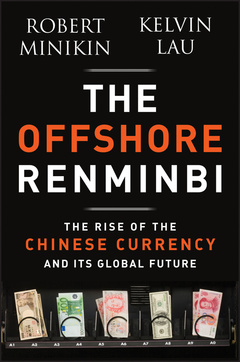The Offshore Renminbi The Rise of the Chinese Currency and Its Global Future
Auteurs : Minikin Robert, Lau Kelvin

Chinese authorities have ambitious plans to "internationalize" the renminbi, transforming it from a tightly controlled domestic legal tender into a global currency for international trade, held by both private and public sector asset managers. The Offshore Renminbi examines this impending currency revolution, outlining why the emergence of China as a major economic power will likely soon be matched by a transformation of the renminbi's role in the global financial system. It explains how new markets for "offshore" renminbi are developing outside mainland China since the country is not yet ready to fully open up its economy to international capital flows, and the regulations that govern them.
The potential growth for the renminbi market is vast, thanks to China's role in the global trading community. The early stages of the internationalization effort were small-scale, but momentum has greatly increased over the past 18 months, making this book more relevant than ever. These developments offer new opportunities (and challenges) for corporate treasurers and investors, as China's profound economic success and growing prominence in global trade may transform offshore renminbi into a new global reserve currency and a legitimate competitor to the U.S. dollar.
- Explores how the "internationalization" of the renminbi is likely to yield a new global currency to rival the U.S. dollar
- Examines "offshore" renminbi and the host of new financial markets they have created, from a spot FX market to Dim Sum bonds in Hong Kong
- Covers broad themes of interest to general readers and policymakers, as well as more detailed issues of practical and direct importance to corporate treasurers and investors
The Chinese government has ambitious plans to make the renminbi a global currency. The Offshore Renminbi explains the complexities of this strategy and the dramatic implications for the global FX markets.
Foreword ix
Preface xiii
List of Acronyms and Key Terms xvii
CHAPTER 1 The New Global Role for the Renminbi 1
A Longstanding—but Failing—Path 4
Allowing Renminbi Markets to Flourish 9
Political Tailwinds for Internationalisation 13
Challenges and Consolidation Risks 19
The Renminbi in a Multipolar World 23
CHAPTER 2 Linking the Offshore and the Onshore Renminbi Markets 25
International Transactions in a Domestic Currency 25
The Starting Point for Renminbi Internationalisation 31
Investability: Opportunities and Challenges 40
Timing Convertibility 45
PBoC and Exchange Rate Policy 50
The Advantages of the Offshore Renminbi 53
CHAPTER 3 The Birth and Evolution of the Offshore Renminbi Market in Hong Kong 57
A Chronological Look at Key Policy Liberalisations 59
More on Renminbi Trade Settlement in the Post–Big Bang Era 79
From Renminbi Trade Settlement to Offshore Renminbi Deposits 93
CHAPTER 4 New Markets—New Jargon, New Opportunities 101
The Chinese Yuan in FX Spot 101
A New Diversity of Forward Markets 109
Opportunities in the CNH Markets 112
Tracking Returns in CNH Deposits 121
The Dim Sum Bond Market Matures 126
CHAPTER 5 Geographical Expansion of the Offshore Renminbi Universe 131
From Hong Kong to Haiwai through Trade 133
Renminbi in London and the Hub-and-Spokes Model 139
Direct Renminbi Cooperation with Mainland China 142
Shanghai’s Aspiration and Infrastructure Overhaul 147
Hong Kong Is Still in Pole Position 151
CHAPTER 6 Drivers for Internationalisation 163
Public Policy: “Replacing” USD 168
Economics: China’s Role in the Global Economy 174
For Investors: Appreciation—but, More Importantly, Diversification 178
For Corporations: Fairer and More Transparent Pricing 182
For Official Reserve Managers: A New Route to Stability? 187
CHAPTER 7 The Rise of the Renminbi and Its Policy Implications 193
The Renminbi’s Rise: A Threat to the Hong Kong Dollar? 193
The Renminbi’s Rise: A Regional FX Anchor 198
The Renminbi’s Rise: The SDR and the IMF 206
The Renminbi’s Rise: The US Dollar in a Multipolar World 213
Afterword: The Life Overseas with the Rising Renminbi 217
Appendix: The CNH Timeline 223
Bibliography 229
About the Authors 231
Index 233
Robert Minikin is the Senior Foreign Exchange Strategist with Standard Chartered Bank, Hong Kong. He is a member of the Global Foreign Exchange Strategy team focusing on Northeast Asia FX, with a particular emphasis on "CNH," the new Chinese yuan (CNY) offshore market in Hong Kong. He is a well known commentator on financial market development who is regularly featured both in the print and broadcast media. Mr. Minikin has more than twenty years of experience in financial market analysis. He holds first and second degrees in economics from the University of London.
Kelvin Lau is a Hong Kongbased economist covering Greater China, specialising in Hong Kong and the Pearl River Delta in Southern China. Kelvin joined Standard Chartered Bank as an economist in September 2000 and is currently a member of the Greater China research team. With a focus on Hong Kong and the Pearl River Delta (PRD) region in Sourthern China, Kelvin provides macroeconomic analysis and on-the-ground views of major economic issues. His views are quoted by various international as well as local media. He holds a degree in economics from the London School of Economics and Political Science.
Date de parution : 01-2013
Ouvrage de 275 p.
16x23.9 cm
Thèmes de The Offshore Renminbi :
Mots-clés :
The Offshore Renminbi, Robert Minikin, Robert Minikin book, forex, forex markets, chinese forex, renminbi, renminbi markets, global renminbi, renminbi forex, international renminbi, renminbi currency, rise of china, chinesefinance, fx markets, foreign exchange markets, offshore renminbi, The Offshore Renminbi: The Rise of the Chinese Currency and Its Global Future, chinese currency, Kelvin Lau, Chinese Yuan, chinese currency, internationalize renminbi, internationalize chinese currency



